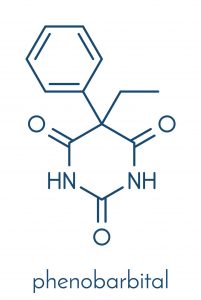Phenobarbital is a barbiturate which depresses the central nervous system. It’s used as a sedative-hypnotic frequently prescribed for treating seizures. Additional uses for this medication include the treatment of stress and the relief of withdrawal symptoms from different medications.
Phenobarbital Facts
 Phenobarbital can be habit-forming, especially when taken doses bigger or more frequent than those prescribed. Even people who take the medication as prescribed for medical purposes will experience a certain amount of tolerance to the effects over time. When misused, tolerance develops quicker and individuals may need increasing amounts to feel the very same effects.
Phenobarbital can be habit-forming, especially when taken doses bigger or more frequent than those prescribed. Even people who take the medication as prescribed for medical purposes will experience a certain amount of tolerance to the effects over time. When misused, tolerance develops quicker and individuals may need increasing amounts to feel the very same effects.
As is true for a number of other prescription medications, barbiturates are potentially harmful because users may think:-
- Phenobarbital doesn’t have the same dependence potential as illegal drugs.
- The medication is basically safe for use and won’t cause substantial negative side effects because it’s prescribed.
Phenobarbital is potentially addictive and can easily jump the line between safe therapeutic dose and deadly dose (Narrow Therapeutic Index). Misuse of this drug, especially in combination with alcohol or other drugs, can:-
- Amplify the effects of both.
- Send amounts of phenobarbital from the blood into the poisonous territory.
Signs and Symptoms
Phenobarbital produces a dulling effect on the central nervous system and may produce these effects:-
- Blisters and lesions on the skin.
- Ataxia, or loss of muscle coordination.
- Altered consciousness and behavior.
It is important to remember that these signs do not necessarily point to abuse, because phenobarbital is a commonly used anti-convulsant and amounts can be tricky to stabilize. But when these effects occur together with more acute signs of toxicity such as hallucinations and true delirium, it’s an indication that the individual needs immediate medical treatment and evaluation for potential addiction. It must be noted that the deep central nervous system depression effects of some of the barbiturate drugs could cause coma and death, if taken in excess.
Effects of Phenobarbital Abuse
In addition to the physical effects mentioned previously, misuse of phenobarbital, like any medication, will typically manifest in different ways, also.
In case you’re worried about the prospect of phenobarbital abuse in yourself or someone you care about, it is important to search for the psychological and social effects of abuse:-
- Memory loss.
- Societal issues, such as increased trend to start arguments.
- Negative changes in performance in college or at work.
Phenobarbital Abuse Treatment
rehabilitation programs approach addiction from several angles using a vast variety of treatment types. The seriousness of addiction will dictate which kind of therapy is best. In addition, it is important to remember that phenobarbital may have life-threatening withdrawal symptoms, so it is crucial to detox under the supervision of a qualified medical practitioner or in a rehabilitation setting.
when you have detoxed safety, you might think:-
- Inpatient rehabilitation programs. These provide immersive maintenance and ongoing support through the recovery procedure. These programs give the advantage of living at home during recovery but are much less immersive.
- 12-step programs. These programs are terrific for people in the process of retrieval, as they provide a supportive network for those living with addiction.
Phenobarbital Statistics
Barbiturates have lately been cast aside in favor of newer drugs, despite their effectiveness in treating epilepsy. The risks outweigh the benefits normally. The truth is:-
- According to the Substance Abuse and Mental Health Services Administration (SAMHSA), 52 million individuals over age 12 from the U.S. have taken prescription medication non-medically at a certain stage.
- Tranquilizers, including barbiturates such as phenobarbital, drop from the top 3 classes of most abused prescription medications, according to a University of Texas study.
- Per SAMHSA, in 2011, 18,282 Emergency Department visits involved the nonmedical use of barbiturates.